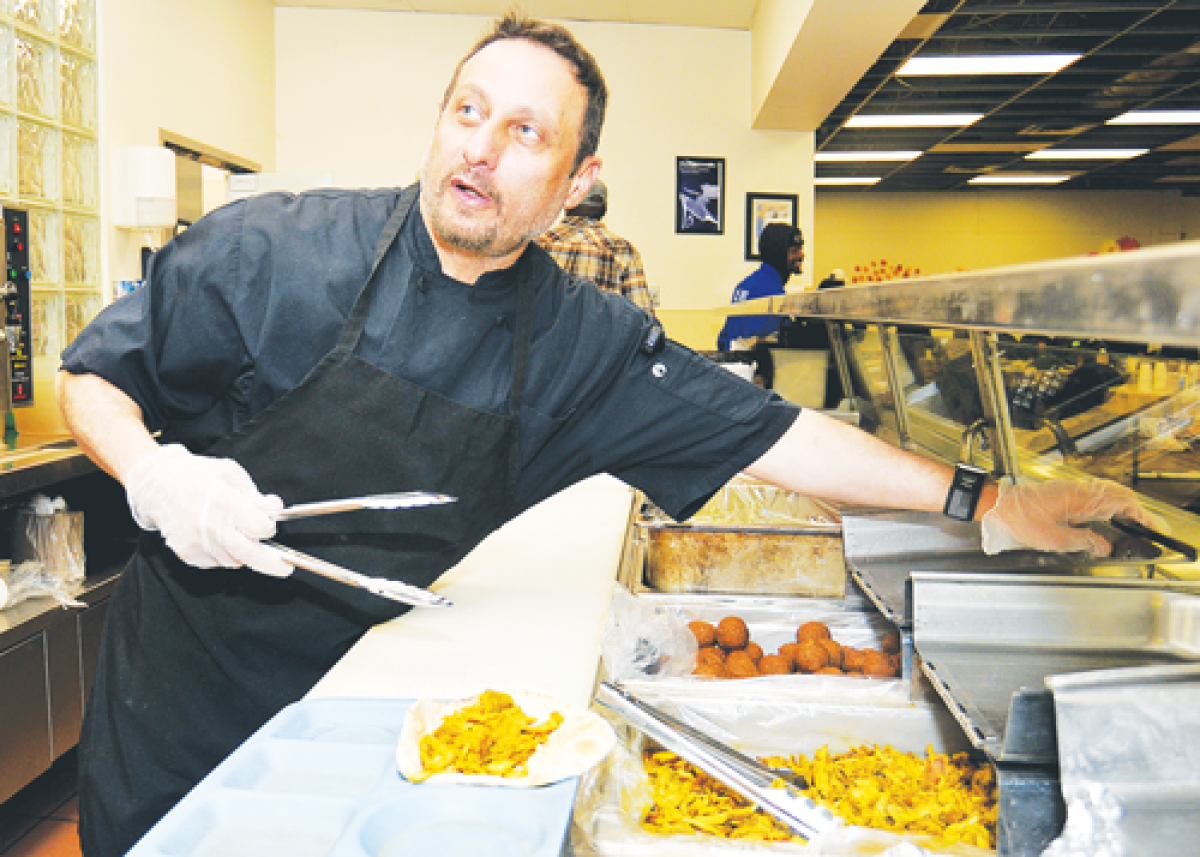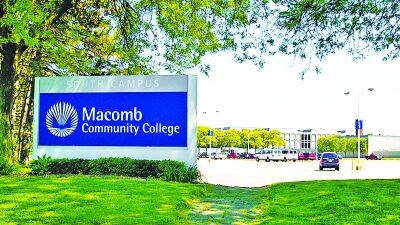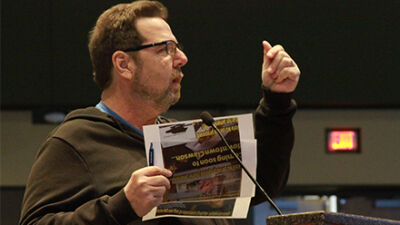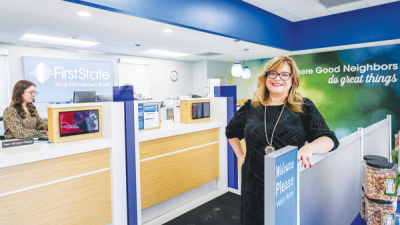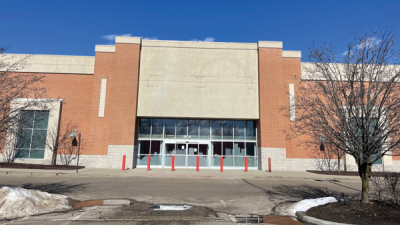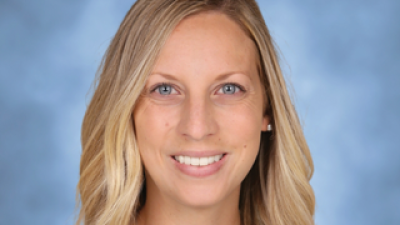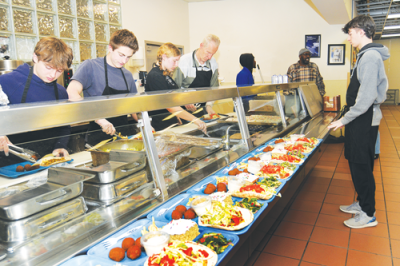
Seniors from University of Detroit Jesuit High School and Academy often volunteer to serve meals.
Photo by Liz Carnegie
STERLING HEIGHTS — For nearly 100 years, the Capuchin Soup Kitchen has fed the hungry in Detroit. It’s challenging work, strained by cost increases due to inflation, supply chain issues, uncertain federal funding and growing demand as more people need help. Last year, its pantry provided 3.4 million pounds of food — a 24% increase from 2023.
To meet the need, donors are essential.
The 13th annual Bocce with the Brothers fundraiser will take place at 5 p.m. Friday, April 11, at Villa Penna, 43985 Hayes Road in Sterling Heights. Tickets cost $75, on sale now at boccewiththebrothers.org. All proceeds benefit Capuchin Ministries, which includes not only the Capuchin Soup Kitchen, but also the Solanus Casey Center, the Capuchin Retreat and others.
The event, for those 21 and older, has historically been a huge success. Last year’s fundraiser hosted nearly 450 attendees and raised more than $100,000.
On offer will be a buffet dinner with beer and wine, desserts from the Capuchin Soup Kitchen’s On the Rise Bakery, unlimited bocce play, live entertainment, live and silent auctions, a cigar tent and cappuccino bar, and more. Capuchin friars will be in attendance to meet guests and play bocce.
“We’re seeing a great need for support right now, usually from very low-income people who have some sort of job or assistance, but it’s not enough to take care of their families,” said Br. Gary Wegner, executive director of the Capuchin Soup Kitchen. “People need food, shelter and transportation, and while we can’t provide them an apartment or a car, we can provide the food part. But just like anyone who goes to the grocery store and sees the price of food going up, so do we, and we have to pay, too.”
Originally, the fundraiser was called Benefit on the Bay, founded by Mike Schodowski, president of shelving.com. The same family-owned business manages a brick-and-mortar site called The Shelving Store in Madison Heights. Now called Bocce with the Brothers, the event continues to be fully funded by shelving.com.
“People have really connected with the event’s mission to support such a valuable organization,” Schodowski said via email. “They love being part of something that’s all about fun, community spirit and giving back.”
The Capuchin Soup Kitchen itself was founded in 1929 at the start of the Great Depression. The kitchen is a signature program of Capuchin Ministries, also known as the Capuchin Franciscan Province of St. Joseph.
Other operations in Michigan include the Solanus Casey Center and Father Solanus Guild, located in Detroit — a place of pilgrimage and prayer named after the Capuchin friar Blessed Solanus Casey (1870-1957), who was known for his direct service to the sick and poor — and Capuchin Retreat, a 95-acre retreat center for spiritual renewal in Washington, Michigan.
Beyond Michigan, the group operates St. Lawrence Seminary High School, a Catholic boarding school in Mount Calvary, Wisconsin.; Capuchin Community Services, which includes a meal program, food pantry, clothes closet and other outreach services in Milwaukee; St. Francis of Assisi Parish and St. Benedict the Moor Parish — faith communities serving diverse urban populations, also in Milwaukee; and mission work at the Crow and Northern Cheyenne Reservations in Montana, providing pastoral and social outreach to indigenous communities there.
The Capuchin Soup Kitchen, which distributes meals at two Detroit sites — 4390 Conner St. and 1264 Meldrum St. — is arguably the most iconic. Wegner attributes its ability to stay open to the generosity of donors.
“We’re always looking for people to help out at our services center,” he added, referring to the Capuchins’ food and clothing pantry, located at 6333 Medbury St. in Detroit. “They can stock shelves, sort clothing and help the guests who come there. They can also help at the two meal sites, as well. We even have people who volunteer as social workers or guest advocates, connecting individuals with those kinds of services.”
The Capuchins also grow fresh produce through a program called Earthworks Urban Farm, located at the meal site on Meldrum Street.
“The volunteers help with planting and tending to our greenhouses and garden. We cultivate seedlings that are then either planted in our farm or other operations,” Wegner said. “A lot of it goes to the kitchens, especially our Meldrum location.
“Some people have been volunteering with us for over 20 years,” he continued. “It’s just what they want to do. They want to give back to their community. As I often say, I’ve yet to meet a generous person who isn’t also a grateful person, or a grateful person who isn’t generous. The two go together in a cycle of generosity and gratitude.”
He emphasized that any level of giving is welcome, since it all adds up in a meaningful way.
“Just the other week, a sweet elderly lady called me wanting to make a donation, and all she could afford was $5 — she’s been a widow for almost two decades, and that’s all that she has to give. And of course, we appreciate it — we had a delightful conversation,” Wegner said.
“Another wrote me saying she didn’t have much to give but she wanted to help because she had walked with her mother during the Great Depression, from Corktown to the soup kitchen, to help Fr. Solanus serve, and when she asked her mother why they didn’t take the trolley, she was told, ‘Because that’s a nickel we can give,’” Wegner said. “I have so many stories of people who had a father or grandfather who arrived from Poland or Malta or other countries and had the misfortune of arriving during the Depression, and they tell me they would’ve starved without our soup kitchen.”
Wegner said he often thinks of immigrants in the U.S. today, pursuing the American Dream of a better life for themselves and their children.
“I see these refugees from Venezuela and other places, and I suspect many of them will want to go back to their country when it’s safe there again. But for those who stay here, I’m convinced my successor down the road — maybe not the next one, but one of them — will get letters from them and their children saying their mom or dad was helped by us, too,” Wegner said.
“Jesus told us, ‘The poor you will always have with you’ — use it as an opportunity to do good for them. I’d love for us to be able to close our doors because there’s no longer a need, but that’s not going to happen, the same way hospitals will never close because there will always be sick people,” Wegner said. “So there’s always a need — and donating and volunteering makes a huge difference.”
For more information about Capuchin Ministries, call (313) 579-2100 or go to thecapuchins.org. Details about how to donate and volunteer are available under “How to help.”
 Publication select ▼
Publication select ▼